Welcome to Kashgar! Where you can sip tea and watch Uighurs be persecuted
Smiling broadly at our little group of tourists, he stepped briefly out of line to greet us in broken English, and stepped quickly back. He had dared to break ranks from a cordon of police blocking an alleyway, while behind him was a machine-gun-topped people carrier whose siren had not stopped blaring the entire morning.
China's military might in one form or another is the latest edition to this medieval city, designed to reassure a nervous visitor they are safe in Beijing's hands. For those of us who missed China's first Cultural Revolution, the world is now being given a unique chance to witness a second unfolding before its very eyes.
Whereas a hapless foreigner straying into the Dragon kingdom during Mao Tse Tung's reign of terror was likely to be thrown into jail or at the very least sent for re-education, North West China's Xinjiang Province - while ruthlessly clamping down on its local Muslim population - is simultaneously rolling out its legendary Silk Road as a premier tourist destination; the idea being that tourism equals infrastructure, equals wealth, equals stability. Tourists are more welcome than ever.
A major fly in the ointment, however, is that this ancient but largely wilderness-filled province four times the size of France into whose Taklamakan desert the entire British Isles would fit comfortably with room to spare, is at war.
The inconvenient truth for China's President Xi Jinping whose much lauded 'One road, one belt' policy is designed to unite all surrounding states into a brotherhood of trade and prosperity, is that the natives of the area forming the hub of his revived Silk Road want nothing to do with it.
For the Turkic Muslim Uighur people, this is their land. The Chinese are unwelcome guests. The Uighurs have more in common with their Islamic brethren scattered around their borders and further afield than they do with the "pork eating unbelievers" who rule them.
 |
For the Turkic Muslim Uighur people, this is their land. The Chinese are unwelcome guests. The Uighurs have more in common with their Islamic brethren scattered around their borders and further afield than they do with the 'pork eating unbelievers' who rule them |  |
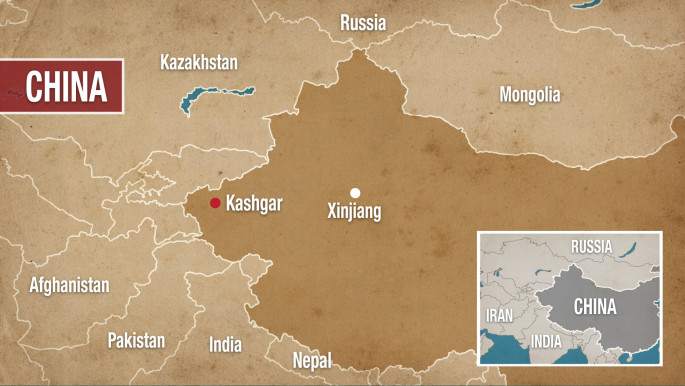 |
|
Beijing's soft power and coaxing have had limited success in taming the native population, whose frequent violent uprisings and reputed links with the Islamic State group goaded the Chinese government in August 2016 into recruiting the recent governor of Tibet, Chen Quanguo, to come and work his magic.
He claims to have had success in quelling similar anti-government sentiments on the plateau and has set to work to crush dissent here too.
Barely a year into office, he has already rolled out a multi-layered surveillance machine designed to extinguish opposition before it reaches the drawing board.
At least 90,000 new police have been recruited with an additional 31,687 security positions advertised. More than 1000 "convenience" police stations have been built across the region, some a mere 100 metres from each other and personal telephones and devices are being monitored as never before.
Disappearances, public shaming, more than one million people in "re-education" camps or worse, and sentencing in absentia are gathering apace; all passports have been confiscated, and students studying abroad are being recalled. Woe betide the family left behind if children don't return.
And it is into this maelstrom that a hapless tourist might wander, unaware of the turbulent undercurrents swirling behind his or her camera lens.
Kashgar, in the south-west of the province, and one of the major sites on the legendary Silk Route, has had a troubled recent history as far as authenticity has been concerned. Following a complete reconstruction of the ancient city over the past six years, critics have condemned the restoration as cynical and phoney, whereas others have hailed it as the best thing that has happened - not only for tourism, but also for residents who all now have indoor plumbing, heating and waterproof roofs for the first time in hundreds of years.
But now there is another unusual string to the tourism bow. Not only can a visitor wander freely through the charming labyrinths of newly paved alleyways and sip Italian coffee on the veranda of an ornately carved mud-walled re-build cafe, but at the same time they are unavoidably privy to the paraphernalia of a "war on terror" played out around them.
 |
Not only can a visitor wander freely through the charming labyrinths of newly paved alleyways and sip Italian coffee on the veranda of an ornately carved mud-walled re-build cafe, but at the same time they are unavoidably privy to the paraphernalia of a 'war on terror' played out around them |  |
This cannot help but add a certain frisson to the usual round of mosques, ancient sites and tours of historical buildings. During our two-week stay, early morning flag-raising ceremonies and punishment sessions to which entire neighbourhoods are summoned were de rigueur.
The city was often brought to a standstill while the military paraded their might, and at least three times a day we watched enthralled as five-feet-nothing shop assistants were instructed in the art of wielding over-sized baseball bats in formation with the intended aim of rendering potential assailants crippled - if not dead - from their efforts.
"If you haven't been to Kashgar, you haven't been to Xinjiang," trumpet the tourist posters around town. But this was certainly going to be a side of Kashgar I would remember for a long time.
Our first Monday in town we followed a crowd of men and women, many with infants and toddlers in tow, rushing towards to a central square. Central Asians overall are not known for hurrying but here was obviously an event worth hurrying for.
As we passed the local primary school, workmen were putting the finishing touches to a double layer of razor wire-topped caging encircling the building. A thousand people had arrived by the stroke of 8 o'clock. The same scenario was being played out in every neighbourhood around the predominantly Uighur old city.
Men and women alike were ordered to remove head coverings seconds before the Chinese flag was raised to an impassioned rendering of the national anthem. Then it was a sharp left turn to swear allegiance to the state with hands on heart, the closing words of which had barely left the mouths of the faithful when the local chief launched a scathing critique of their attitude.
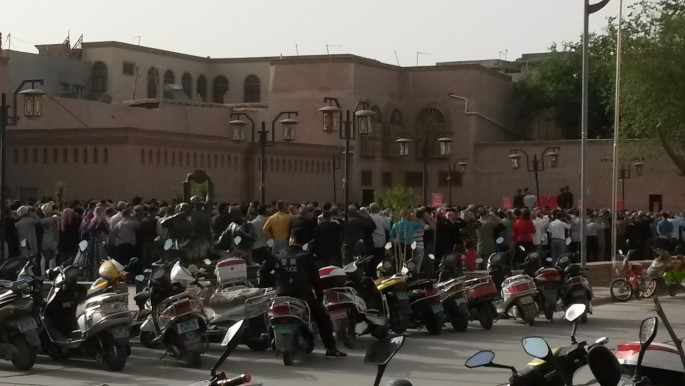 |
|
| Uighurs swearing allegiance to the state at the compulsory Monday morning flag-raising meeting in Kashgar [Ruth Ingram] |
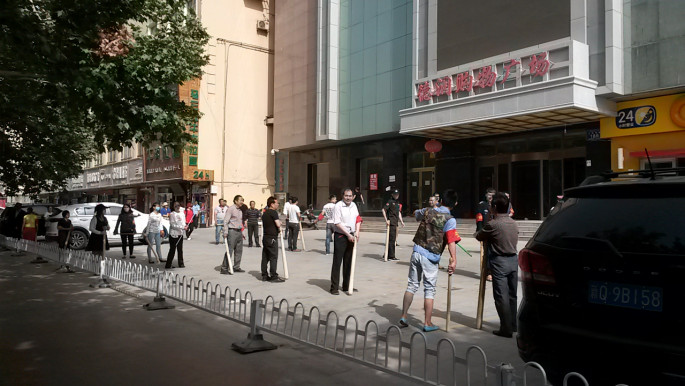 |
|
| Shopkeepers lining up for their three-times-a-day roll call and weapon brandishing exercises in Kashgar [Ruth Ingram] |
The previous week he been forced to tell them to remove head coverings, this week's rendering of the anthem was so lethargic they would have to repeat it three times before it passed muster. He was reaching the end of his patience. Next week it would be better - or else.
The "or else", we were to discover, was not empty rhetoric. The following 45 minutes were crammed with public shaming, confessions, criticisms and explanation of new laws.
A young man named Akmal got up to speed-read his four-page lament for having been five minutes late for the meeting two weeks ago, and for keeping his restaurant in less than pristine condition. He determined to rectify these misdemeanours thanks to President Xi Jinping and a two-week period of re-education during which he had gained a deeper appreciation of The Party and its efforts on behalf of the unworthy citizens of his province, of which he must be the least worthy.
Several more repentant latecomers read their speeches, and then it was time for new laws. A spirited area chief announced that despite residents' misgivings, the compulsory health checks where DNA and blood samples would be taken was nothing to be alarmed about.
 |
Men and women alike were ordered to remove head coverings seconds before the Chinese flag was raised to an impassioned rendering of the national anthem |  |
This was not some sinister plot to harm them, but a generous gift from Beijing to spot preventable diseases and to ensure they were the healthiest they could be, he said. Everyone was expected to take part without delay.
His second announcement concerned the hoarding of Qurans dated before 2012, ancient Islamic texts and household items engraved with Arabic script. Everyone was guilty of this kind of sentimentality, he said, but it was now time to have a clean sweep and hand everything in to the government. Who needed all this junk anyway, cluttering up valuable living space?
Anyone not surrendering these family heirlooms on time would be punished severely according to the law, and any visitor to these homes not reporting their finds would also face the full legal consequences. But, he said, it needn't come to that, need it?
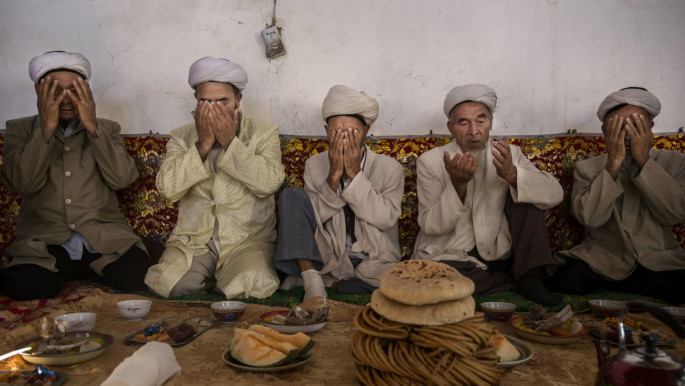 |
|
| Explainer: China's persecution of Uighur Muslims |
He added that everyone should be aware of literature they might have at home that was now no longer legal. They should pay great attention to weekly announcements concerning the mounting tide of recently deemed illegal books, or face serious consequences for hoarding them. Re-education or worse would await anything discovered during the twice-weekly house-to-house inspections.
This led him on to the most important business of the day, he said which was mutual surveillance. The community-watch scheme was being rolled out even more thoroughly and resolutely than before.
Each group of between five to 13 families, and ten retail units, now had a leader and a second-in-command, on whom would fall the full burden of blame should anyone in their group fall foul of any of the increasing number of new laws. And this would not only include the members of the unit, but also three generations of each of their family members, wherever they might live in China or anywhere else in the world.
Gatherings in homes for special events could now only comprise three generations of family members, and where more guests were expected, permission had to be obtained in advance from the local committee and a representative sent to attend the said gathering to prevent "careless talk".
On no account was the conversation to stray into religious territory. This would be punished most severely.
 |
Gatherings in homes for special events could now only comprise three generations of family members and where more guests were expected, permission had to be obtained in advance from the local committee... On no account was the conversation to stray into religious territory. This would be punished most severely |  |
Fresh from the weekly meeting - which concluded with a photographic record of everyone present, a roll call by each community unit leader and a carting away of miscreants to be "re-educated" - we wandered back into the old city, past gaggles of elderly women on every street corner waving triangular red pennants.
None were interested in my "idle chatter", or questions as to the whys and wherefores of their flag-waving exercise but with at least ten CCTV cameras pointing in every direction on each of the street corners, who could blame them?
Trips to pretty much everywhere during our stay were dominated by the substantial police presence, designed, we were reliably told, to protect us. Trips to anywhere by bus were punctuated by checkpoints, for ID checks and body scanning of Uighurs.
Native Han Chinese travellers were exempt. There were so many metal detectors in town that one could be forgiven for thinking the government had shares in the manufacturing companies. And the revival of medieval instruments of torture wielded by the "home guard" would have been fascinating in the extreme were it not for the suspicion that they would actually be used.
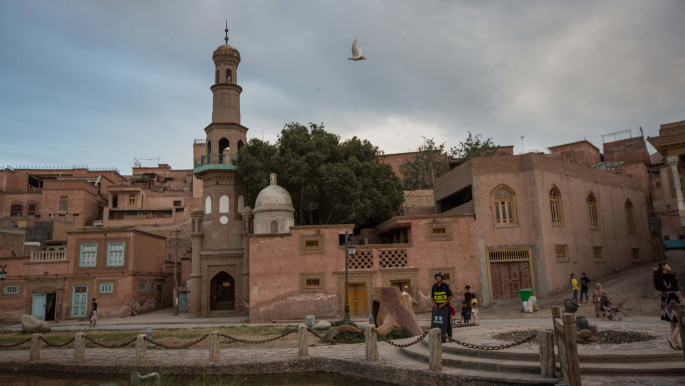 |
|
| A closed local mosque seen standing in the Kashgar old town, in the northwestern Xinjiang Uighur Autonomous Region [Getty] |
 |
One evening's entertainment was unique. Silhouetted against a full moon, a squad of police recruits were being taken through their evening drill in front of the iconic Hayt Kar mosque |  |
One day we inadvertently strayed off the tourist route to visit a market, and no sooner had we stepped down from the bus than we were encircled by guards carrying between them a red tipped spear, a bill hook, something that looked like a medieval polearm and one sporting a metal rod with six-inch nails spiralling down the main shaft. Welcome to Kashgar!
Evenings were balmy. Nothing was nicer than fresh noodles or sipping tea beside a beautifully restored fountain or eating Kashgar's famous homemade ice cream. But these days no meander through the dusty streets would be complete without the latest addition to Kashgar's tourism experience.
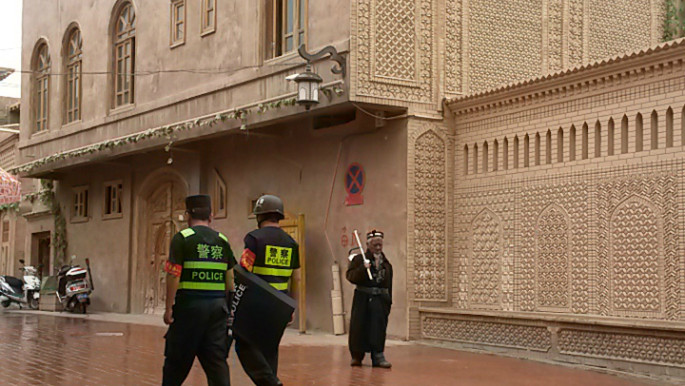 |
|
|
Police patrolling the alleyways of Kashgar [Ruth Ingram] |
Forget live music and national dancing. You can find that anywhere in the world. One evening's entertainment was unique. Silhouetted against a full moon, a squad of police recruits were being taken through their evening drill in front of the iconic Hayt Kar mosque.
They just couldn't quite get the garrotting movement right and were being urged on to perfection by an overzealous sergeant major.
Lingering if we could without attracting too much attention, and resisting the urge to take photos, we slid into the shadows and made our way to our favourite teahouse. To a background of live music and a pot of fresh tea there was still no getting away from it.
We whiled away a happy half hour watching the guard changing under our balcony in front of the newly converted "convenient police station" opposite and wended our way home. Suddenly, out of the gloom, the piece de resistance of our day. As if staged for our benefit alone, a troop of soldiers rushed from behind yelling and waving machine guns.
Oblivious to any consternation they might be causing tourists in their midst, they raced past, and not ten metres away set up in formation. Groups of three! Raise rifle, step forward, kick right, kick left, downward thrust of gun onto assailant's neck, raise gun again and failing a first time kill, heavy thrust of bayonet into assailant's body.
If all else fails, take up shooting position on one knee and kill. Disband, disperse, regroup and repeat.
Open mouthed we gawped at the spectacle played out several times and felt privileged to have been selected to witness this tiny exhibition of military might, and momentarily grateful that it was not directed at us.
And this is the worrying thing. There is a target audience and it is not tourists. With most countries along the Silk Road now in Beijing's pocket and too grateful for mountains of development aid poured in their direction to speak out, there are few dissenters left to trumpet the cause of the Uighur people - the latest victims of China's war on terror, who are rounded up daily, forcibly disappeared, re-educated and squeezed until all spirit and hint of resistance to Beijing's rule is extinguished.
My holiday would certainly be memorable but my own two-week dalliance with China's military might was nothing compared to the dismal reality of everyday life for the Uighur Muslims of Xinjiang.
The author is writing under a pseudonym to protect her identity
Join the conversation: @The_NewArab





 Follow the Middle East's top stories in English at The New Arab on Google News
Follow the Middle East's top stories in English at The New Arab on Google News


